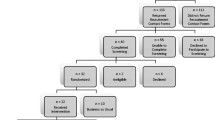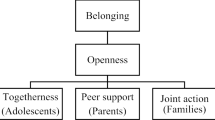Abstract
Depression is prevalent among adolescent girls, but few receive mental health treatment. Adolescent girls often forgo needed mental health treatment because they fear responses of peers about depression. Understanding the processes of how adolescent girls respond to peers with depression is an important first step to improve access to mental health treatment. This qualitative study describes the knowledge, perceptions, and behaviors of adolescent girls about depression and mental health treatment within their peer group. The investigators conducted two focus groups, with adolescent girls (n = 21), in a public high school in the southern U.S. Grounded theory methods were utilized to identify a beginning substantive theory about perceptions and behaviors of adolescent girls related to depression in their peers. Participants cognitively processed mental health concepts similarly to adults. However, their affective responses to peers with mental illness fluctuated between adult and child perspectives. Participants expressed concerns about individuals with depression that have previously been identified in adults, but expressed unique perspectives that reflect their transitional stage of development. Findings provide new information about how adolescent girls respond to peers with depression, define areas for further investigation, provide directions for constructing developmentally appropriate mental health educational interventions for adolescent girls, and elucidate the need to provide guidance to women with whom adolescent girls have sustained contact.

Similar content being viewed by others
References
Aarons, G. A., Monn, A. R., Leslie, L. K., Garland, A. F., Lugo, L., Hough, R. L., et al. (2008). Association between mental and physical health problems in high-risk adolescents: A longitudinal study. Journal of Adolescent Health, 43, 260–267.
Beasley, P. J., & Beardslee, W. R. (1998). Depression in the adolescent patient. Adolescent Medicine State of the Art Reviews, 9(2), 351–362.
Burns, J. R., & Rapee, R. M. (2006). Adolescent mental health literacy: Young people’s knowledge of depression and help seeking. Journal of Adolescence, 29, 225–239.
Chandra, A., & Minkovitz, C. (2007). Factors that influence mental health stigma among 8th grade adolescents. Journal of Youth and Adolescence, 36, 763–774.
Commission on Women’s Health. (1997). The commonwealth fund survey of the health of adolescent girls. New York, NY.
Cutcliffe, J. R. (2003). Reconsidering reflexivity. Qualitative Health Research, 13(1), 136–148.
Cyranowski, J. M., Frank, E., Young, E., & Shear, K. (2000). Adolescent onset of the gender difference in lifetime rates of major depression. Archives of General Psychiatry, 57(1), 21–27.
Draucker, C. B. (2005). Processes of mental health service use by adolescents with depression. Journal of Nursing Scholarship, 155–162.
Fleming, J. E., & Offord, D. R. (1990). Epidemiology of childhood depressive disorders: A critical review. Journal of the American Academy of Child & Adolescent Psychiatry, 29(4), 571–580.
Frojd, S., Marttunen, M., Pelkonen, M., Pahlen, B., & Kaltiala-Heino, R. (2007). Adult and peer involvement in help-seeking for depression in adolescent population. Social Psychiatry and Psychiatric Epidemiology, 12, 945–952.
Glaser, B. (1978). Theoretical sensitivity. Mill Valley, CA: Sociology Press.
Glaser, B. G., & Strauss, A. (1967). Discovery of grounded theory: Strategies for qualitative research. Mill Valley, CA: Sociology Press.
Grace, J. T., & Powers, B. A. (2009). Claiming our core: Appraising qualitative evidence for nursing questions about human response and meaning. Nursing Outlook, 57(1), 27–34.
Hennessy, E., & Heary, C. (2009). The development of children’s understanding of common psychological problems. Child and Adolescent Mental Health, 14(1), 42–47.
Jellinek, M. S., & Snyder, J. B. (1998). Depression and suicide in children and adolescents. Pediatrics in Review, 19(8), 255–264.
Keenan-Miller, D., Hammen, C. L., & Brennan, P. A. (2007). Health outcomes related to early adolescent depression. Journal of Adolescent Health, 41(3), 256–262.
Kelly, C. M., Jorm, A. F., & Rodgers, B. (2006). Adolescents’ responses to peers with depression or conduct disorder. Australian and New Zealand Journal of Psychiatry, 40, 63–66.
Kuehn, B. M. (2005). Mental illness takes heavy toll on youth. Journal of the American Medical Association, 294(3), 293–295.
Lincoln, Y. S., & Guba, E. G. (1985). Naturalistic inquiry. London: Sage.
Lipson, J. G. (1989). The use of self in ethnographic research. In J. M. Morse (Ed.), Qualitative nursing research (pp. 61–75). Rockville, MD: Aspen.
Logsdon, M. C. (2004). Depression in adolescent girls: Screening and treatment strategies for primary care providers. Journal of American Medical Women’s Association, 59, 101–106.
Marcell, A. V., & Halpern-Felsher, B. L. (2007). Adolescents’ beliefs about preferred resources for help vary depending on the health issue. Journal of Adolescent Health, 41(1), 61–68.
McCarthy, J., Downes, E. J., & Sherman, C. A. (2008a). Looking back at adolescent depression: A qualitative study. Journal of Mental Health Counseling, 30(1), 49–68.
McCarthy, C. A., Mason, W. A., Kosterman, R., Hawkins, J. D., Lengua, L. J., & McCauley, E. (2008b). Adolescent school failure predicts later depression among girls. Journal of Adolescent Health, 43, 180–187.
National Academy of Sciences. (2008). Adolescent health services: Missing opportunities. Retrieved from www.nap.edu/catalog/12063.html.
Samargia, L., Saewyc, E. M., & Elliott, B. (2006). Foregone mental health care and self-reported access barriers among adolescents. Journal of School Nursing, 22(1), 17–24.
Schinke, S. P., Fang, L., & Cole, K. (2008). Substance use among early adolescent girls: Risk and protective factors. Journal of Adolescent Health, 43, 191–194.
Swahn, M. H., & Bossarte, R. M. (2007). Gender, early alcohol use, and suicide ideation and attempts: Findings from the 2005 youth risk behavior survey. Journal of Adolescent Health, 41(2), 175–181.
Wisdom, J. P., & Agnor, C. (2007). Family heritage and depression guides: Family and peer views influence adolescent attitudes about depression. Journal of Adolescence, 30, 333–346.
Woodgate, R. L. (2006). Living in the shadow of fear: Adolescents’ lived experience of depression. Journal of Advanced Nursing, 56(3), 261–269.
World Health Organization. (2004). The world health report 2004: Changing history, annex. Geneva: World Health Organization.
Acknowledgments
The authors acknowledge funding from research grants awarded to the first author by the Iota Zeta Chapter, Sigma Theta Tau International, and a Ruth Craddock Research Grant, University of Louisville School of Nursing.
Author information
Authors and Affiliations
Corresponding author
Rights and permissions
About this article
Cite this article
Pinto-Foltz, M.D., Hines-Martin, V. & Cynthia Logsdon, M. How Adolescent Girls Understand and Manage Depression Within Their Peer Group: A Grounded Theory Investigation. School Mental Health 2, 36–43 (2010). https://doi.org/10.1007/s12310-009-9024-7
Published:
Issue Date:
DOI: https://doi.org/10.1007/s12310-009-9024-7




